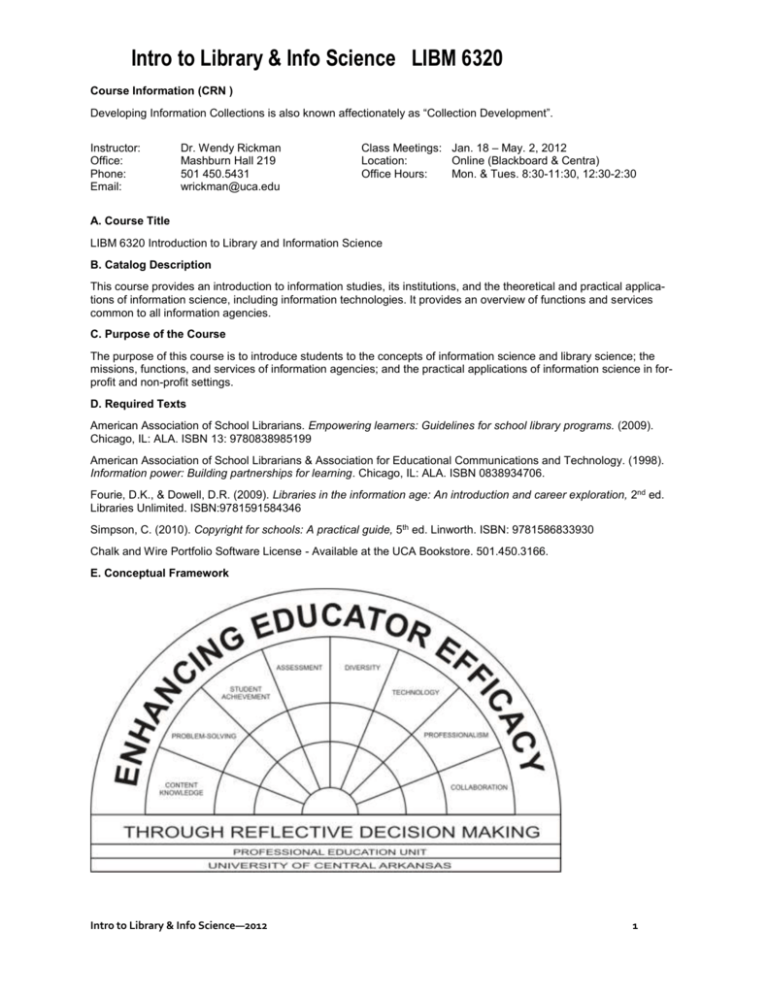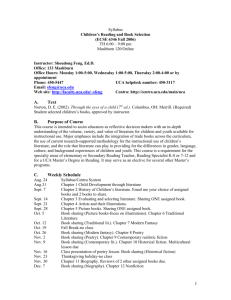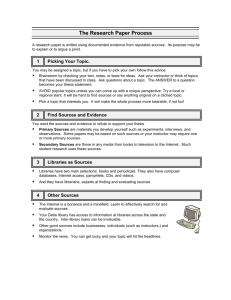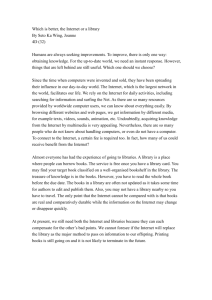2012_Syllabus6320 - UCA-6320-LIBM
advertisement

Intro to Library & Info Science LIBM 6320 Course Information (CRN ) Developing Information Collections is also known affectionately as “Collection Development”. Instructor: Office: Phone: Email: Dr. Wendy Rickman Mashburn Hall 219 501 450.5431 wrickman@uca.edu Class Meetings: Jan. 18 – May. 2, 2012 Location: Online (Blackboard & Centra) Office Hours: Mon. & Tues. 8:30-11:30, 12:30-2:30 A. Course Title LIBM 6320 Introduction to Library and Information Science B. Catalog Description This course provides an introduction to information studies, its institutions, and the theoretical and practical applications of information science, including information technologies. It provides an overview of functions and services common to all information agencies. C. Purpose of the Course The purpose of this course is to introduce students to the concepts of information science and library science; the missions, functions, and services of information agencies; and the practical applications of information science in forprofit and non-profit settings. D. Required Texts American Association of School Librarians. Empowering learners: Guidelines for school library programs. (2009). Chicago, IL: ALA. ISBN 13: 9780838985199 American Association of School Librarians & Association for Educational Communications and Technology. (1998). Information power: Building partnerships for learning. Chicago, IL: ALA. ISBN 0838934706. Fourie, D.K., & Dowell, D.R. (2009). Libraries in the information age: An introduction and career exploration, 2nd ed. Libraries Unlimited. ISBN:9781591584346 Simpson, C. (2010). Copyright for schools: A practical guide, 5th ed. Linworth. ISBN: 9781586833930 Chalk and Wire Portfolio Software License - Available at the UCA Bookstore. 501.450.3166. E. Conceptual Framework Intro to Library & Info Science—2012 1 Introduction to Library and Information Sciences LIBM 6320 The vision of the PEU at UCA is one of enhancing educator efficacy through reflective decision-making. Efficacy is the belief in one’s ability to positively impact the learning of all learners, including those with diverse needs. Efficacy deteriorates to the degree educators attribute student failure to external factors, such as the students’ background, culture, parents/guardians, socioeconomic status, and the like. Educator efficacy to affect P-12 learning is enhanced when these educators demonstrate essential knowledge, skills and dispositions drawn from the eight knowledge bases that undergird our programs, illustrated in the visual above. In a synthesized and targeted way, efficacy provides a rationale for the conceptual framework. In the realm of reflective decision-making, efficacy is the reason why we reflect—it represents our ownership of the learning environment and achievement of all learners. The degree to which PEU candidates demonstrate efficacy directly correlates to their attainment of the knowledge, skills, and dispositions necessary to positively impact the learning of all learners. F. Use of Technology Graduate candidates are expected to utilize educational technology in a variety of ways within this course. Learning about Blackboard course management software, Centra VoIP software, and Chalk and Wire Portfolio software and their uses as a distance education delivery tools is the first. Opportunities to communicate with the instructor and classmates with the above mention software and the University email system are provided. The instructor will share relevant websites and other documents with students online. Candidates will be urged to share their findings from the Internet on several course topics. As graduate candidates acquire skills with the above software and technologies, other programs will be used such as an office suite (word processor, spreadsheet, presentation software) and desktop publishing software. G. Diversity Library media specialists (LMS) by the very nature of their positions serve diverse audiences, including ESL students, students of various ethnic backgrounds, economic backgrounds, the physically & mentally disabled, GLBT students, and the non-readers. This emphasis on diversity is addressed in the information agencies assignment with students defining and reporting on accommodations provided for diverse populations. H. Objectives At the end of the course, the candidate will be able to • Define and relate the following concepts: information science, library science, and information. • Describe the components of the information transfer process. • Identify the categories and missions of information agencies. • Discuss the common services of information agencies. • Discuss the common functions of information professionals. • Identify the objectives of special libraries and information centers. • Identify professional organizations and their local, regional, and national structure as well as their respective publications. • Discuss some of the historical information need that has driven the establishment of information collections and libraries. • Define and discuss intellectual property, copyright, and privacy issues in relation to information agencies. • Distinguish between interlibrary loan and document delivery services. • Discuss the impact of the Internet on the field of library and information science. I. Course Outline A brief history of libraries Definition of information science, library science, and information The information transfer process Categories of information agencies and their related missions Common services in information agencies Intro to Library & Info Sciences – 2012 2 Introduction to Library and Information Sciences LIBM 6320 Objectives of special libraries and information centers Common functions performed by information professionals Professional organizations – benefits and publications Intellectual property and copyright The impact of the Internet J. Field Experience Candidates will visit different types of information agencies, interview a representative of each agency, and report on the services, functions, missions, and accommodations for patron diversity. K. Course Evaluation Candidate performance will be evaluated as follows: • One exam. The exam will be based on class discussions, outside readings, and class activities. The exam is worth 100 points (Date: ). • Information Agencies Report & PowerPoint. This assignment is worth 75 points (Date: ). • Professional Topics & PowerPoint. This assignment is worth 50 points (Date: ). • Copyright Brief and PowerPoint. This assignment is worth 50 points (Date: )*. Total points possible from assignments: 275. Grading Scale Late assignments will be penalized by 10% of the overall assignment score. A = 93-100 B = 83-92 C = 73-82 D = 63-72 F = < 63 L. Attendance Policy Candidates are allowed two (2) missed class meetings with no grade penalty. These absences are neither excused nor unexcused. Absences after the second missed class meeting will result in 10 points per absence docked from the final course grade. The fifth absence will result in an F for the course or a WF if dropping the course. Graduate candidates are expected to exhibit a high degree of professionalism as reflected in their speech. Prompt and consistent attendance is an essential dimension of professional behavior, and candidates will be expected to attend all class sessions. If a student is unable to attend a class session, the student must notify the instructor as soon as possible. An assignment scheduled on a missed day is still expected on or before the due date. If the student is absent on a scheduled exam day, the student must make arrangements with the instructor to make up the exam. It is the student’s responsibility to get all notes and assignments. M. Student Handbook Policies Candidates are expected to follow the policies regarding academic dishonesty, sexual harassment, and academic issues as outlined in the current UCA Student Handbook, which can be found at www.uca.edu. Candidates should familiarize themselves with all policies included therein. Plagiarism is the presentation of another’s work, ideas, or expressions whether you do so intentionally or as a result of careless documentation. It is a serious violation and carries severe penalties - failure on the assignment or in the course. Although collaboration is encouraged, any work submitted as part of a course assignment must be the candidate’s own work or else referenced using the appropriate reference format, in this program APA, 6th edition. Please consult the instructor if you have any questions concerning what constitutes plagiarism. The College of Education’s Student Academic Grade Appeal Policy offers additional guidelines from that outlined in the University’s Student Handbook. It specifically defines a timeline for the appeal process. A student who wishes to Intro to Library & Info Sciences - 2012 3 Introduction to Library and Information Sciences LIBM 6320 appeal a final grad in a course should follow the guidelines found in the College of Education Student Academic Grade Appeal Policy. This policy is located on the COE website at www.uca.edu/divisions/academic/coe. The University of Central Arkansas adheres to all requirements of the Americans with Disabilities Act. If you need an accommodation under this Act, please contact the UCA Office of Disability Services at 501 450.3613. Professional and Ethical Conduct Policy The College of Education’s/Professional Education Unit’s Professional and Ethical Conduct Policy is concerned with professional and ethical behavior not addressed by other university or college policies. Students must adhere to the prescribed professional and ethical standards of the profession for which they are preparing. The policy provides a definition of professional and ethical misconduct, guidelines for reporting misconduct, and an appeal process. This policy is located on the College of Education website at http://www.uca.edu/education/documents/Professional_and_Ethical_Conduct_Policy_4-2010.pdf. Academic Integrity The University of Central Arkansas affirms its commitment to academic integrity and expects all members of the university community to accept shared responsibility for maintaining academic integrity. Students in this course are subject to the provisions of the university’s Academic Integrity Policy, approved by the Board of Trustees as Board Policy No. 709 on February 10, 2010, and published in the Student Handbook. Penalties for academic misconduct in this course may include a failing grade on an assignment, a failing grade in the course, or any other course-related sanction the instructor determines to be appropriate. Continued enrollment in this course affirms a student’s acceptance of this university policy. N. Bibliography Battles, M. (2004). Library: An unquiet history. New York: Norton, W.W. & Company, Inc. Beiser, K. (1999). Integrated library system software for smaller libraries. Part. 2. School, Academic, and public libraries. Library Technology Reports 35(40, 365-395. Borgman, C.L. (May 1999). What are digital libraries? Competing visions. Information Processing & Management 35, 227-43. Boss, R. (1997). The library administrator’s automation handbook. Medford, NJ: Information Today. Boss. R. (1998). Model technology plans for libraries. Library Technology Reports 34(1), 9-109. Erikson, R., & Markuson, C. (2001). Designing a school library media center for the future. Chicago: American Library Association. Fountain, J.F., & Gorman, M. (2004). Cataloging workbook. Westport, CT: Libraries Unlimited. Luenberger, D. (2006). Information science. Westport, CT: Princeton University Press. Melanie, J., & Norton, J. (2000). Introductory concepts in information science. New York: Information Today, Inc. Pemberton, J.M., & Prentice, A. (1990). Information science: The interdisciplinary context. New York: Neal-Schuman Publisher, Inc. Raber, D. (2003). Problem of information: An introduction to information science. Chicago: Rowman & Littlefield Publishers, Inc. Saffady, W. (2000). The status of library automation at 2000. Library Technology Reports 36(1), 3-70. Intro to Library & Info Sciences – 2012 4





